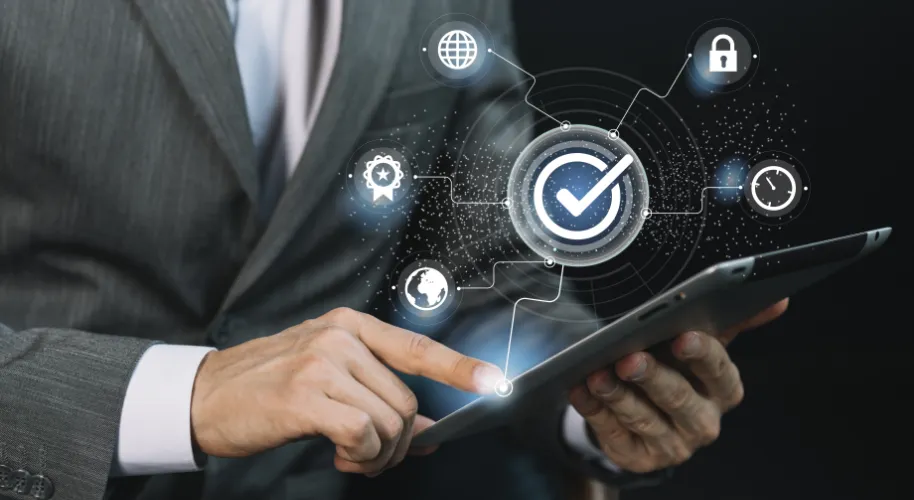-
Improved Efficiency
By automating and streamlining business processes, ERP Software eliminates manual work, reduces errors, and helps businesses become more productive.
-
Enhanced Data Visibility And Accuracy
With a centralized database, ERP systems provide real-time access to accurate and up-to-date information across different functions, allowing for better decision-making.
-
Integrated Business Processes
ERP systems break down data silos between departments, enabling smooth collaboration and coordination among different teams within an organization.
-
Standardized And Optimized Processes
ERP systems often incorporate best practices and industry standards, helping organizations standardize their processes and improve efficiency.
-
Better Customer Service
With a comprehensive view of customer information, ERP systems enable organizations to deliver personalized and timely services, resulting in improved customer satisfaction.
-
Cost Savings
By eliminating redundant processes, optimizing inventory management, and improving overall operational efficiency, ERP systems can help reduce costs and increase profitability.
It's important to note that ERP systems are typically highly customizable to meet an organization's specific needs. Depending on the organization's requirements and preferences, they can be implemented as on-premises software or as Cloud-based ERP.
Dev Technosys offers expert dedicated developers under a flexible Time and Material model to turn your vision into powerful, scalable digital solutions
A call echoes across business transformation in a world where innovation and efficiency reign supreme. Are you ready to embark on a heroic quest to construct an Enterprise Resource Planning (ERP) system from the essence of imagination? Prepare to wield your programming prowess and navigate the labyrinthine paths of software architecture, database design, and seamless integration.
This extensive guide invites you to unleash your inner hero and venture forth into uncharted territories of built an ERP solution. We will weave a tapestry of technological marvels together, forging a digital stronghold where finance, logistics, human resources, and more unite in perfect harmony. Brace yourself for an adventure where streamlined processes, empowered decision-making, and boundless potential await.
So gather your courage, sharpen your coding sword, and let the symphony of innovation guide your path. The time has come to sculpt a legendary ERP system, leaving an indelible mark on the annals of enterprise transformation. Embrace the challenge, and let the journey begin!
What is ERP System?
ERP stands for Enterprise Resource Planning. It speaks of a certain type of ERP system that coordinates and controls several internal business operations and key processes.
The purpose of an ERP system is to facilitate the flow of information between different departments and functions, allowing for streamlined operations and better decision-making.
An ERP system typically comprises a centralized database and interconnected modules or applications.These classes address a variety of business topics, including accounting, human resources, manufacturing, supply chain management, and CRM.
If you want to develop an ERP System, then it is important to learn some of the exclusive benefits of this. Here are some important benefits.
How To Develop an ERP System From Scratch?
A well-designed and effective Enterprise Resource Planning (ERP) system is essential for success in today's fast-paced company environment. However, if you want to develop an ERP system from scratch can be a daunting task. That's where the expertise of Node.js development services comes into play. This comprehensive guide will explore the steps to develop an ERP system from scratch.
-
Define Your Business Requirements
Before you dive straight into the process to develop an ERP system, to clearly define your business requirements, identify the key functionalities and modules you need, such as finance, inventory management, HR, and CRM. Determine the specific features and workflows that align with your business processes. This stage is crucial as it lays the foundation for the development process.
-
Research and Select a Reliable Mobile App Development Company
To ensure a successful ERP system development, partnering with a reputable mobile app development company is essential. Conduct thorough research, review their portfolio, and check client testimonials. Look for an ERP development company with experience in develop an ERP system, a strong technical team, and a track record of delivering quality projects on time.
-
Collaborate and Plan the Development Process
Once you've selected a mobile app development company, collaborate closely with their team to plan the development process. Define the project scope, timeline, and milestones. Discuss your business requirements, objectives, and any specific customization needed. The custom software development service will provide insights and expertise to refine your ideas and develop an ERP system.
-
Design the User Interface and Experience
An ERP system's success is greatly influenced by the design of the user interface and user experience. Create UI/UX designs that are simple to use and visually appealing in close collaboration with the development team. Make sure the design aspects complement your brand identity and the requirements of your target audience. Before proceeding, the design can be validated through prototyping and user testing.
-
Develop and Integrate Core Functionality
The AngularJS development company will proceed with the actual development of the ERP system. Based on your defined requirements, they will implement the core functionality, including modules for finance, inventory management, HR, and CRM. The development team will leverage its software architecture, database management, and coding expertise to create a scalable and robust system.
-
Conduct Rigorous Testing and Quality Assurance
To guarantee the dependability and functionality of the ERP system, thorough testing is essential. The software development company will conduct extensive testing, including functional testing, performance testing, and security testing. This step helps identify and resolve any bugs or issues before the system is deployed.
-
Deploy, Train, and Support
Once the ERP system is thoroughly tested and refined, it is ready to create an ERP system. A seamless transition will be achieved thanks to the mobile app development company's assistance in the deployment process.
They will provide training sessions to your staff on effectively using the system. Ongoing support and maintenance services will be provided to address any issues or updates that may arise.
Key Features of ERP System
An ERP system integrates various business processes into a centralized platform; features of ERP software are crucial to learning if you are about to develop an ERP system from scratch.
-
User Panel
-
Dashboard
The user panel usually provides a centralized dashboard that overviews key business metrics, such as sales, inventory levels, financial data, and production status. It allows users to access and analyze essential information quickly.
-
User Roles and Permissions
ERP systems have user management capabilities, enabling administrators to define user roles and assign specific permissions. This feature ensures that users have appropriate access levels and can perform tasks relevant to their roles.
-
Data Management
The user panel allows users to manage data within the ERP system. They can create, update, and delete records across different modules, such as customer data, vendor information, product details, and employee profiles.
-
Sales and Order Management
This feature enables users to manage the sales process, including creating and tracking sales orders, generating quotes, managing customer accounts, and monitoring sales performance. It may also provide features for managing pricing, discounts, and promotions.
-
Inventory Management
The ERP user panel typically includes inventory management functionality, allowing users to track and manage inventory levels, perform stock transfers, generate purchase orders, and monitor stock movements across multiple locations or warehouses.
-
Financial Management
Financial modules are frequently included in ERP systems, allowing users to control financial operations including general ledger, accounts payable, accounts receivable, budgeting, and financial reporting. Users can generate financial statements, reconcile accounts, and enter and handle financial transactions.
-
Human Resources Management
The user panel may include modules for managing HR processes, such as employee information, attendance tracking, leave management, payroll processing, performance evaluations, and training management. It helps streamline HR tasks and facilitates employee data management.
-
Reporting and Analytics
ERP systems offer reporting and analytics features to assist users in understanding the operation of their businesses. Users can generate predefined reports or create custom reports, analyze data, and visualize trends and patterns through charts and graphs.
-
Collaboration and Communication
Some ERP systems offer collaboration tools like internal messaging, document sharing, and task management features. These features promote teamwork and enable users to communicate and collaborate within the ERP platform.
-
Customization and Integration
ERP systems often provide options for customization to adapt to specific business needs. Users can configure workflows, add custom fields, define business rules, and personalize the user interface. ERP integration capabilities allow the ERP system to connect with other software or third-party applications, enabling seamless data exchange.
-
-
Admin Panel
-
User Management
A role-based authorization system allows administrators to create and manage user accounts, assign permissions, and control access to different modules and features of enterprise software.
-
Role-based Access Control
The panel defines roles and assigns permissions to different user groups. This function makes sure that users can only access data and features that are pertinent to their roles and responsibilities.
-
Configuration and Customization
The admin panel provides options to configure and customize the ERP system according to the organization's requirements. This includes setting up organizational hierarchies, defining workflows, and configuring system preferences.
-
Data Management
Administrators can manage the data within the ERP system, including importing and exporting data, performing data backups, and implementing data security measures.
-
System Monitoring and Reporting
The admin panel allows administrators to monitor the system's performance, track user activities, and generate reports on various aspects of the system, such as usage statistics, inventory levels, sales reports, and financial data.
-
Integration Management
ERP systems often need to integrate with other software applications or external systems. The admin panel provides tools to manage and configure these integrations, ensuring smooth data exchange between systems.
-
Security and Access Control
Admins can configure security settings, enforce password policies, and manage authentication methods to ensure data security and prevent unauthorized access to the enterprise mobility solution.
-
System Upgrades and Maintenance
The admin panel enables administrators to manage system upgrades, apply patches and updates, and schedule maintenance activities without disrupting regular operations.
-
Help and Support
The admin panel may include resources and documentation to assist administrators in troubleshooting issues, accessing user manuals, and seeking technical support from the ERP system provider.
-
How Much Does It Cost To Develop an ERP System From Scratch?
The cost to develop an ERP system from scratch can vary significantly depending on various factors, such as the system's complexity, the desired features and functionalities, the technology stack used, the development team's rates, and the project timeline. In general, to develop an ERP system can be a substantial investment.
Typically, the cost of ERP development can be anywhere from $8,000 to $25,000. This includes requirements analysis, design, development, testing, deployment, and ongoing maintenance expenses. The additional costs of implementing ERP software may arise from infrastructure setup, data migration, user training, and integration with existing systems.
To get a more accurate estimate, it's crucial to consult with an experienced CRM development company or hire a dedicated team of developers. They may evaluate your demands and offer a thorough cost breakdown depending on your particular requirements and professional objectives.
In A Nutshell!
In conclusion, developing an ERP system from scratch is complex and demanding. It requires a deep understanding of business processes, strong technical expertise, and careful planning.
However, with the right approach and resources, it is possible to create a customized and efficient ERP system tailored to an organization's specific needs. Each step is crucial in ensuring a successful ERP software development project, from defining requirements and designing the architecture to implementing and testing the system. With dedication and perseverance, organizations can achieve a robust ERP system that enhances operations and drives growth.
Frequently Asked Question
-
What Is An ERP System?
An ERP system, or Enterprise Resource Planning system, is a software solution that integrates various business processes and functions into a unified system to streamline operations, improve efficiency, and facilitate data-driven decision-making.
-
Why Should I Develop An ERP System From Scratch?
If you want to develop an ERP system from scratch provides the flexibility to tailor the system to your specific business needs, ensuring seamless integration with existing processes. It also allows scalability and future customization as your business grows and evolves.
-
What Are The Key Components Of An ERP System?
An ERP system typically consists of modules for various functional areas, such as finance, human resources, inventory management, supply chain, customer relationship management (CRM), and manufacturing. These modules work together to provide comprehensive supply chain management software for managing different aspects of the business.
-
What Technologies Are Commonly Used To Develop An ERP System?
The technologies used to develop an ERP system may vary, but commonly employed ones include programming languages like Java, C#, or Python, web development frameworks like Angular or React, and databases like MySQL or Oracle. Cloud-based solutions are also gaining popularity.
-
What Are The Challenges In Developing An ERP System From Scratch?
Machine learning development from scratch can be complex and challenging. Some common challenges include defining comprehensive requirements, ensuring seamless integration with existing systems, managing data migration, addressing security concerns, and providing user-friendly interfaces that meet the needs of various stakeholders.

















